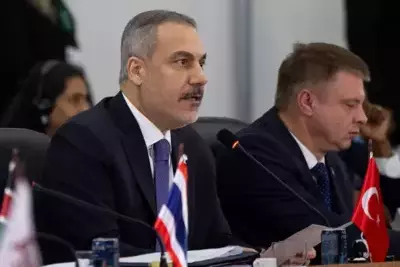Today, a meeting of the Normandy contact group to resolve the situation in the East of Ukraine, is expected to be held in Berlin. German Chancellor Angela Merkel and French President Francois Hollande will meet with Russian President Vladimir Putin and his Ukrainian counterpart Petro Poroshenko. Neither Moscow, nor Berlin expects any breakthrough. A well-known German political scientist and expert on Russia, Alexander Rahr, also noted in an interview to DLF that he is ‘rather pessimistic’. The expert expects that the positions of the parties will be very clearly defined once again, and the old road map, approved by all the participants of the Minsk agreement in 2015, will be observed to a greater or lesser extent. "Then we will get closer to stability in Ukraine at some moment,’’ he said.
‘’There was a following problematic situation. At the very beginning, a year and a half ago, there was a need to provide the Minsk Agreement, otherwise we would be involved in a war in Europe - Russia against the West, and the Ukrainians would be supplied with arms. So, a great war was averted, but a peace has not been achieved,’’ the expert recalled. "Now a question arises, what will happen next. Ukraine has decided to change the road map slightly. After Russia ‘annexed’ Crimea, Ukraine doesn’t want to tolerate the Russian protectorate on its eastern territories. On the other hand, the road map was signed, and it is clearly stated that Ukraine has to ensure the autonomy of the two separatist republics of Donetsk and Lugansk, which isn’t observed during the past few months. Ukrainians has braked, explaining its position by the fact that it is the parliament’s fault. Ukraine, of course, and it is quite clear, doesn’t want to lose the war. On the other hand, Russia says, ‘what was signed - is signed’, so the process should continue,’’ Rahr said.
One of the key aspects of the negotiations is an observance of the ceasefire in the Donbas. "It should happen with the help of a more powerful OSCE’s mandate. Especially now, during the German Presidency, the OSCE is obliged to control the situation . Both the Ukrainian and Russian side has expressed an idea to provide the OSCE observers with weapons, so that they can actually monitor the situation on the front line and thus prevent a further exchange of fire between the sides. But the OSCE has not yet taken an advantage of this opportunity to strengthen its mandate or considers it too dangerous to do so,’’ the expert complained.

Speaking about the role of Angela Merkel and Francois Hollande in the negotiations, Rahr said: "I really don’t envy Ms Merkel and Mr Hollande. They have to deal with many forces that are either sabotaging the Minsk agreement, or immediately saying that nothing will work out. Europeans has a chance, finally, to assist in the establishment of a peace on their own continent. But we know that not everyone, at least the part of the US government, is agree with the fact that Germany and France have taken the leading role in this situation. There are also such countries as Poland and the Baltic States, fearing Russia and demanding a stronger mandate for NATO and tougher sanctions against Russia.’’ The political scientist reminded that the Minsk process is absolutely clearly stated that the sanctions are not an end in itself, they were introduced to ‘compel’ Russia to fulfill the Minsk Agreement. ‘’A problem is that Ukraine should fulfill them as well, but Ukrainians seem to think that the sanctions against Russia should be tightened further, as far as it is an economical weapon of the West to assert their positions against Russia. So, there is a very complicated tangle of concerns, but I think that Germany and France have power, diplomatic courage, and the political will to resolve this situation properly,’’ the German expert expressed hope.
Referring to the debate about the appropriateness of the invitation of Vladimir Putin to Berlin in connection with his policy in Ukraine and Syria, criticized by the West, Alexander Rahr said: ‘’The matter is to remain in a dialogue, and the Russian side has its own truth, attitude and own interests. We should talk about this, I think. On one hand, its good, when Ms Merkel requires again and again the orientation of foreign policy on values, but it works only partially. We also have to pursue realpolitik. it means to have a dialogue with a partner or opponent, to understand what he plans, to talk about strategies, but to make compromises as well.’’
Commenting on the meeting of the EU Foreign Ministers, during which it was decided not to tighten sanctions against Russia, the political scientist expressed confidence that the sanctions are the latest step. "We have seen how the sanctions influenced during the Soviet era, namely, only partially. The sanctions in connection with the Syrian issue will drive Russia into a corner absolutely, after that Russia will announce that it won’t deal with the West anymore. Russia then will orient itself on China. And our economy will suffer from this. I believe that the sanctions are an extreme measure. But as long as we can carry on a dialogue, it is necessary to find a compromise, and we need a compromise in Ukraine and Syria, exactly the compromise, where there will be not just one winner. These are two dangerous world hotbeds, which can end with even greater conflicts. They need to be extinguished, and for this it is necessary to conduct any kind of dialogue. I think that Russia is also in search of a dialogue with us, because it doesn’t want to be isolated,’’ Alexander Rahr summed up.
















